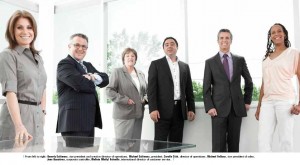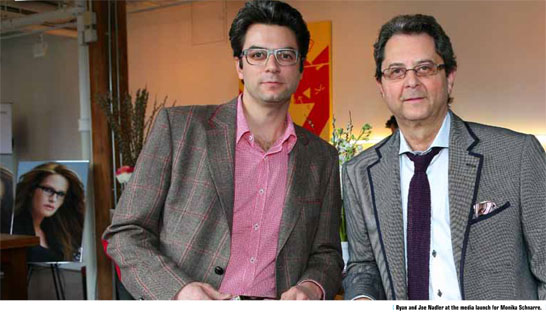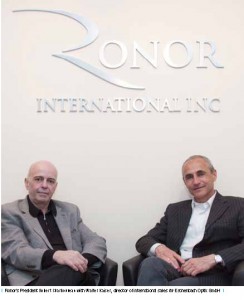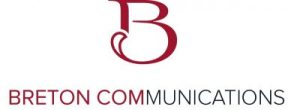ByJoAnne Sommers
 When Rodney Adam Suliteanu founded a frame distribution company in Montrealin 1961, he didn’t realize that he was laying the groundwork for an international optical powerhouse. But half a century later, WestGroupe is celebrating its 50th anniversary as a recognized industry leader with a presence in 47 countries and hopes of expanding into others.
When Rodney Adam Suliteanu founded a frame distribution company in Montrealin 1961, he didn’t realize that he was laying the groundwork for an international optical powerhouse. But half a century later, WestGroupe is celebrating its 50th anniversary as a recognized industry leader with a presence in 47 countries and hopes of expanding into others.
Rodney’s original business plan entailed importing and distributing frames to local opticians and optometrists. Today, in addition to bringing licensed international brands to the Canadian marketplace, the company has a large export business and Rodney’s children – Beverly and Michael – are advancing his vision of being at the forefront of the international eyewear sector.
Although Michael often helped his father with “grunt work” as a young child – assembling catalogue binders and sweeping floors at the office on weekends – he didn’t seriously consider joining WestGroupe until he was a student a tToronto’s York University, where he completed his BA in economics.
“I wanted to carve out something for myself until a friend pointed out that it’s more difficult to take over a family business than to start one from scratch. He was right – it is harder. But it’s been worth because I have been able to put my own imprint on the company while maintaining the principles on which my father built his business.”
In 1991, Michael began training in the lab and later went on the road selling eyewear. He also completed the optician program at Barrie’s Georgian College.
Beverly Suliteanu joined the WestGroupe team in 1994, after receiving her MBA from Queen’s University and working in marketing in the pharmaceutical industry. Today she is creative director and vice president of product development, while Michael is company president. Rodney, now 76, serves as chairman of the board.
“We’re successful because Bev and I respect the company’s history and dad respects our vision for the future,” Michael says. “He is our confidant and knows everything the company is doing. And the three of us make all important business decisions collegially.”
Nonetheless, there are clear areas of responsibility:Beverlyis in charge of creative design and product execution, while Michael runs the office, oversees sales and generally moves the business forward. The model works well, says Michael, “because our roles are very different and we respect one another’s opinions. We don’t hold decisions against one another and never say, ‘I told you so.’ When we make a mistake we learn from it and move on.”
WestGroupe’s family environment – which is one of its core values – extends to its employees – 60 of whom work at the Montreal corporate headquarters and 22 sales representatives who are scattered across the country.
“They’re our life force, our hands and feet in the marketplace,” Michael says. “Many of our employees have been with the company for years, which I think speaks volumes about us. We need the corporate systems for the sake of efficiency but our business has always been about people, not numbers.”
Another key to WestGroupe’s success is its long-standing, close-knit relationships with customers and their international distributors.
“Dad taught us to be honest and ethical at all times and to do the right thing for those we work with,” says Michael. « For us, it’s less about doing a high volume of business than it is about doing business the right way.”
Interestingly, says Michael, Rodney Suliteanu didn’t sign contracts with his customers or vendors. “His mantra was, ‘All you have is your word,’ and he sealed every business deal with a handshake.”
The heart of WestGroupe’s business is its product. “At the end of the day if the product quality is poor or it doesn’t sell you have nothing,” Michael notes.
Westgroupe has two divisions: Western and Wescan. Western’s brand portfolio includes in-house designed brands such as Superflex, Bertelli, Levi’s and Izumi, as well as distributed designer brands including Perry Ellis and Elizabeth Arden. The Wescan division has developed several distinctive and highly successful eyewear brands of its own, including Fysh UK, Kliik denmark and Evatik.
“We’re very proud of the fact that our proprietary brands are distributed in 47 countries and we’re looking forward to moving into the next 40 countries,” Michael says. “The brands we’ve created are becoming household optical names outside Canada: in the U.S.we work with two distributors and over 70 sales people now carry our brands, while worldwide we have approximately 165 salespeople who sell our brands in over 12,000 optical doors.”
But despite their growth plans, he says, WestGroupe never loses touch with its roots. “We invest in reaching consumers and eyecare professionals around the world and bring home what we learn there. The main lesson is the importance of marketing. Optical shops and optometrists are the same world over – they all need frames that sell and we want them to sell our frames.”
To celebrate its 50th anniversary, WestGroupe moved into a new 34,000 square foot facility earlier this year. It boasts state-of-the art technology and offers a wide array of on-site products and services.
As to the future, Michael has 15-year-old twin daughters who may become involved with the company at some point. “The business is there for them if they want it but I won’t push them just like my dad never pushed me. It’s their decision.”
Whatever happens in the future, Michael Suliteanu considers himself a fortunate man. “I love my work and I think our employees love their jobs, too. I wake up happy every morning because each day is a new and exciting challenge.”




